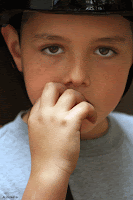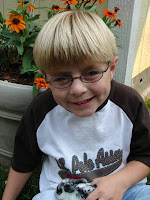There is no doubt that kids with Aspergers and High-Functioning Autism (HFA) are much more prone to nervousness than their neurotypical peers. The nervous child on the autism spectrum is one who:
- has low self esteem
- is easily frightened
- is easily upset by minor inconveniences (e.g., small changes in routine)
- lacks self-confidence
- cries a great deal on slight provocation
- worries about family, school, friends, or activities
- worries about things before they happen

Nervous kids on the spectrum are often overly bothered or sensitive. Some may seek a lot of reassurance from parents, and their nervousness may interfere with many of their day-to-day activities. Moms and dads should not discount their youngster’s inability to cope “normally.” Because nervous kids may also be quiet, compliant and eager to please, their difficulties may be missed. Moms and dads need to be alert to the signs of excessive nervousness in their child so they can intervene early and prevent further complications.
Here are some tips to help your nervous child to learn to relax and be peaceful:
1. Activities that encourage cooperation rather than competition are especially helpful in fostering self-esteem. For example, mentoring programs in which an older child helps a younger one learn to read can do wonders for both children. Volunteering and contributing to your local community can have positive effects on self-esteem for everyone involved.
2. Aspergers and HFA kids are generally not helped when moms and dads tell them to stop being afraid of something. What is helpful is an approach in which you acknowledge their fears and at the same time let them know that you will help them overcome these fears.
3. Be a positive role model. If you're excessively harsh on yourself, pessimistic, or unrealistic about your abilities and limitations, your child might eventually mirror you. Nurture your own self-esteem, and your child will have a great role model.
==> How To Prevent Meltdowns and Tantrums In Children With High-Functioning Autism and Asperger's
4. Be spontaneous and affectionate. Your love will help boost your youngster's self-esteem. Give hugs and tell her you're proud of her when you can see her putting effort toward something or trying something at which she previously failed.
5. Comfort your youngster and let him know that you will work on problems together as they arise. He is never alone.
6. Create a safe, loving home environment. Children who don't feel safe are at greatest risk for developing poor self-esteem. A youngster who is exposed to moms and dads who fight and argue repeatedly may feel they have no control over their environment and become helpless or depressed.
7. Don’t “jump in” too early to help “fix” your youngster’s problems. Remember to give him lots of time to express his negative feelings around worries and problems first where you are just listening and acknowledging feelings before helping him to figure out a solution.
8. Establish a regular bedtime routine consisting of quieter activities that help your youngster to gradually relax.
9. Establish consistent daily routines and structure. Routines reduce nervousness, and regular daily patterns emphasize predictability. A regular routine will give a sense of control to both parent and youngster. Nervous kids do not cope well with a disorganized, spontaneous family life style.
10. Give positive, accurate feedback. Comments like "You always work yourself up into a meltdown" will make Aspergers and HFA children feel like they have no control over their outbursts. A better statement is, "I can see you were very upset with your sister, but it was nice that you were able to talk about it instead of hitting her." This acknowledges the youngster's feelings, rewards the choice made, and encourages him or her to make the right choice again next time.
11. Help your youngster to understand that the negative and pessimistic things she says to herself about herself are not helpful and can influence how she feels and behaves.
12. Help your youngster notice different feelings by naming various feelings she or others may experience. Explain how people show their feelings (e.g., through faces, bodies, words) and that showing your feelings is an important way for others to understand how you are feeling. Help your youngster notice how different feelings “feel” in her own body (e.g., tight hands, butterflies in stomach, etc.).
==> Parenting System that Significantly Reduces Defiant Behavior in Teens with Aspergers and High-Functioning Autism
13. Help your youngster with their worries and problems by teaching him how to problem-solve by defining the problem, brainstorming all possible solutions and their consequences, and choosing the best solution.
14. Identify and redirect inaccurate beliefs. It's important for moms and dads to identify their child’s irrational beliefs about himself, whether they're about perfection, attractiveness, ability, or anything else. Helping children on the spectrum set more accurate standards and be more realistic in evaluating themselves will help them have a healthy self-concept. Inaccurate perceptions of self can take root and become reality to these children.
15. It is helpful for kids to talk about their feelings; however, talking about feelings is not easy for special needs kids, especially when they are asked directly. It is important for moms and dads to watch and listen carefully for the times when the youngster does express feelings, either directly through words or indirectly through behaviors. At these times, you can help him by acknowledging and accepting his feelings through simply reflecting them back to him and refraining from providing advice or asking questions. When a youngster’s feelings are criticized, disapproved of, or not accepted by the mother or father, his internal sense of self is weakened.
16. It is important for these young people to have limits set and consequences for breaking the limits. Kids feel secure when there are limits setting restrictions on inappropriate behaviors.
17. Learning relaxation skills will help kids feel better when they are anxious, worried or scared. It will also help them learn that they have some control over their own bodies rather than being controlled by their nervousness. One way to help your youngster relax is to encourage slow, deep breathing. Another way to relax is to ask her to alternately tense and relax her muscles. You can also help your youngster use her imagination to relax. Help her to imagine a safe and relaxing place and to notice the good relaxing feelings in her body.
==> Teaching Social Skills and Emotion Management to Children and Teens with Asperger's and High-Functioning Autism
18. Listen to your youngster and allow him to express his feelings though his fears sound irrational. Let him know he can always talk to you when anything is bothering him.
19. Meet with your youngster’s teacher to find out how he is doing socially and academically and ask for help in getting your youngster to school.
20. Never make fun of, ridicule, scream at, punish, or demean your youngster because of his nervous demeanor. Do not allow family members, or other adults do so either.
21. Provide opportunities for exercise. Exercise is helpful in relieving stress and helping your youngster’s body to relax.
22. Soothing an autistic youngster is a very helpful strategy that moms and dads can use in relieving nervousness. These strategies communicate to the youngster that she is safe and cared for. Verbal reassurances of safety and love, rocking, cuddling, holding, massage, singing, and telling stories are just some of the soothing strategies that moms and dads can use. Moms and dads may be surprised to realize that their kids may sometimes need soothing that seems to the parent to be too “babyish” for the youngster’s age. However, nervous kids DO need extra soothing experiences that relax and relieve the tension in their bodies.
23. Take care of the basic needs of your youngster – especially to prevent fatigue and hunger.
24. Take stock of what is happening at home. Are there stressful situations going on that are worrying your youngster? Are mornings tension-filled as you try to get everyone out the door? Reduce house-hold stress as much as possible.
25. There are many kid’s books available that deal specifically with nervousness, fears and worries. These books can be very helpful for kids as the stories will often model various ways of coping with fears and nervousness.
26. Watch for signs of abuse by others, problems in school, trouble with peers, and other factors that may affect your child’s self-esteem. Encourage your child to talk to you or other trusted adults about solving problems that are too big to solve by himself.
27. When your child is feeling nervous, encourage her to engage in activities she enjoys (e.g., playing with a favorite toy, doing a fun art or craft activity, doing something active outside, playing a game, reading a book, playing with friends, etc.). Aspergers kids will often need the assistance and attention of their moms and dads to engage in these fun activities if they are feeling nervous.
==> Parenting Children and Teens with High-Functioning Autism: Comprehensive Handbook
28. While these kids are generally not helped when parents demand that they face their fears all at once, they are helped when parents can gently encourage them to approach feared situations. This is because exposure to feared situations leads to desensitization and reduction of the fear and nervousness. However, approaching feared situations can be difficult for nervous kids since they would rather avoid them. One way of helping a youngster approach a feared situation is to go about it in small steps so that each step is achievable and gradually becomes a little more difficult. Another important strategy for moms and dads is to reward the youngster for trying to approach a feared situation. The boy or girl will also find it helpful to be reminded that the fear will get smaller over time. In addition, kids can be reminded of fears and difficult situations that they have overcome in the past.
29. Severe nervousness in these kids can be treated. Early treatment can prevent future difficulties (e.g., loss of friendships, failure to reach social and academic potential, feelings of low self-esteem, etc.). Treatments may include a combination of the following:
- behavioral treatments
- consultation to the school
- family therapy
- individual psychotherapy
30. As a last resort, if nervousness becomes severe and begins to interfere with your youngster’s usual activities, (e.g., separating from parents, attending school, making friends, etc.), then consider anti-anxiety medications prescribed by your doctor.
More resources for parents of children and teens with Asperger's and High-Functioning Autism:
==> Launching Adult Children with Asperger's and High-Functioning Autism: Guide for Parents Who Want to Promote Self-Reliance
==> Launching Adult Children with Asperger's and High-Functioning Autism: Guide for Parents Who Want to Promote Self-Reliance
==> Unraveling The Mystery Behind Asperger's and High-Functioning Autism: Audio Book
==> Highly Effective Research-Based Parenting Strategies for Children with Asperger's and High-Functioning Autism
==> Do you need the advice of a professional who specializes in parenting children and teens with Autism Spectrum Disorders? Sign-up for Online Parent Coaching today.
==> Parenting System that Reduces Problematic Behavior in Children with Asperger's and High-Functioning Autism

.jpg)


